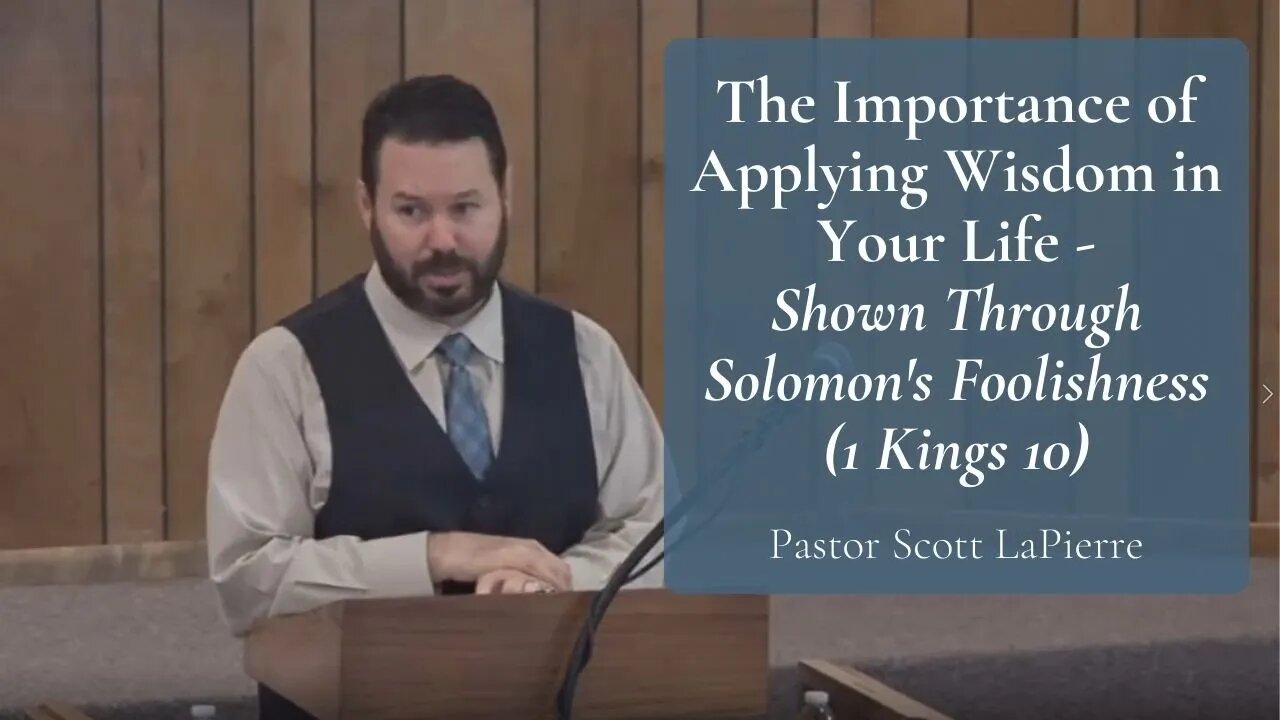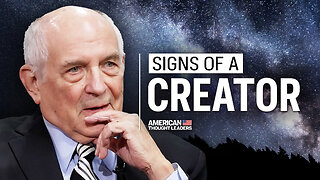Premium Only Content

The Importance of Applying Wisdom in Your Life – Shown Through Solomon’s Foolishness (1 Kings 10)
Scripture is clear that applying wisdom is one of the most important parts of the Christian life. If we don't apply wisdom, which is to say we aren't applying the knowledge we've received, we're being foolish.
We’ve been in a series on wisdom, and in the last two sermons we looked at Solomon. I want you to see how important it is not just to receive wisdom, but to apply it, and Solomon is the best example in Scripture. These verses will help us see that Solomon didn’t apply the wisdom he received.
The importance of going beyond hearing (or reading) to obeying is a theme in Scripture. Jesus said, “My mother and My brothers are these who hear the word of God and do it . . . If you know these things, blessed are you if you do them” (Luke 8:21, John 13:17). We do not learn God’s Word simply for the sake of knowing it. We learn wisdom so that we can apply it.
James 1:22 says, “But be doers of the word, and not hearers only, deceiving yourselves.” This verse reveals a common deception. People learn God’s Word and believe they have done enough even though they have not applied it to their lives. Husbands and wives make this same mistake when they believe they have a marriage built on Christ simply because they know what the Bible teaches, even though they are not obeying the instruction. Our responsibility goes much further than simply obtaining information. We have to obey what we have learned to apply wisdom.
View all of pastor Scott LaPierre's books on Amazon: https://www.amazon.com/Scott-LaPierre/e/B01JT920EQ
Receive a free copy of Pastor Scott's book, "Seven Biblical Insights for Healthy, Joyful, Christ-Centered Marriages": https://www.scottlapierre.org/subscribe/
For Scott LaPierre's conference and speaking information, including testimonies, endorsements, and contact info, please visit: https://www.scottlapierre.org/conferences-and-speaking/
Here's the accompanying podcast episode: https://www.scottlapierre.org/importance-of-applying-wisdom/
If invited for a speaking engagement, you can expect:
• Professionally prepared and delivered messages
• A handout with lessons and discussion questions
• Copies of Pastor Scott's books to offer as gifts to increase registrations (if you desire)
• Advertising of your event on Scott's website and social media (if you desire)
• Facebook ads and/or a Facebook event page so the event can serve as an outreach (if you desire)
• Prompt responses to any communication
• Prompt replies to phone calls, emails, and/or text messages
00:00 Sermon Lessons for The Importance of Applying Wisdom in Your Life - Shown Through Solomon's Foolishness (1 Kings 10)
22:03 Lesson 1: God wants leaders ________________ ______ (Deuteronomy 17:14-17; Psalms 20:7, 33:16; Proverbs 14:34, 11:28).
Lesson 2: The typology:
32:55 • Part I: Egypt is a type of ______ __________ (Exodus 1:5 cf. Exodus 12:37).
34:10 • Part II: Moses is a type of ______ ______ (Romans 3:20).
35:36 • Part III: Joshua is a type of __________ (Hebrews 4:1-10).
36:18 • Part IV: Israel’s journey is a type of ______ ______________ (2 Kings 18:21; Isaiah 36:6; and Ezekiel 17:15).
47:26 Lesson 3: Wisdom must ____ ______________ (1 Kings 3:14, 10:26-29).
Family Worship Guide for The Importance of Applying Wisdom in Your Life - Shown Through Solomon's Foolishness (1 Kings 10)
Day 1: Read Deuteronomy 17:14-17; Psalms 20:7, 33:16; Proverbs 14:34, 11:28, and discuss: Although we don’t have a king, what application do you see from these verses for this presidential election season? Why did God single out horses, wives, and wealth? What might presidents put their trust in today that kings put their trust in in the Old Testament? How can any leaders, including fathers and husbands who serve as the heads of their home, ensure that they are trusting in God versus something else?
Day 2: Read Exodus 1:5, Exodus 12:37, Romans 3:20, Hebrews 4:1-10, 2 Kings 18:21, Isaiah 36:6, and Ezekiel 17:15 and discuss: How is Egypt a type of the world, Moses a type of the law, Joshua a type of Jesus, and Israel’s journey a type of our journey? Why were kings told not to return to Egypt? Do you see any other typology that Pastor Scott did not mention?
Day 3: Read 1 Kings 3:14, 10:26-29, and discuss: Describe Solomon’s compromise before he received wisdom. What are high places? After God gave Solomon wisdom, why did he still tell him he needed to obey? What does it mean to apply wisdom? Why don’t we always apply wisdom? What does it mean to be under Moses vs. being under Joshua? Hint: consider what each man represents.
-
 17:17
17:17
Lady Decade
23 hours ago $2.78 earnedMortal Kombat Legacy Kollection is Causing Outrage
12.6K6 -
 35:51
35:51
Athlete & Artist Show
1 day ago $6.58 earnedIs Ryan Smith The Best Owner In The NHL?
25.9K2 -
 22:56
22:56
American Thought Leaders
1 day agoCharles Murray: I Thought Religion Was Irrelevant to Me. I Was Wrong.
18.2K5 -
 36:22
36:22
Brad Owen Poker
5 hours agoGIGANTIC $17,000+ Pot In BOBBY’S ROOM! TRAPPING Top Pro w/FULL HOUSE!! Big Win! Poker Vlog Ep 326
23.5K -
 3:53
3:53
NAG Daily
22 hours agoRUMBLE RUNDOWN: DREAM HACK SPECIAL W/Greenman Reports
15.5K6 -
 1:28
1:28
Damon Imani
1 day agoThey Laughed at Trump’s Cognitive Test — Damon Made Them REGRET It!
25.1K9 -
 9:14
9:14
Freedom Frontline
1 day agoAdam Schiff PANICS As Eric Schmitt Exposes His Dirty Lies LIVE
16.5K14 -
 10:32
10:32
GBGunsRumble
1 day agoGBGuns Armory Ep 153 Adler Arms AD-9`
11.4K2 -
 35:53
35:53
Degenerate Plays
4 hours ago $0.37 earnedRuckus Randy And Repair Ronald (Socks On) - Call of Duty: Modern Warfare 2 (2009) : Part 7
7.23K1 -
 38:35
38:35
Stephen Gardner
1 day ago🔥What JUST leaked out of Congress. PROVES Trump RIGHT!!
100K138